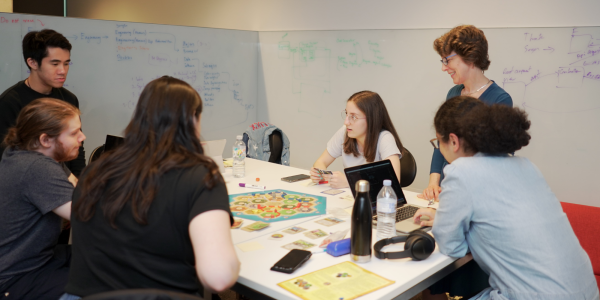To gain a more holistic understanding of engineering, we sat down with Julia Prior, the Head of Innovation and Software Development Strategy at WiseTech Global. Julia helped shed light on the importance of human interaction and collaboration, to facilitate excellence in engineering.
When people think of engineering, their thoughts stray towards the technical. Common images that come to mind may include circuits, robots and complex, never-ending code. But the technical side alone isn’t what allows engineering as we know it to flourish.
Julia’s primary role involves collaborating with software developers, to improve current processes and ensure that they are supportive of the developers’ expertise. This in turn enhances productivity and overall quality of work. Her PhD thesis used ethnography as a research methodology, to delve into the way people can work collaboratively to solve complex problems.
This approach is also what inspired her design of the Software Development Studio at UTS, which she established in 2014 and ran until 2020. Her key considerations were collaboration and the forging of meaningful relationships. Students are placed in groups of mixed year level and experience for two main reasons:
Accountability: There is an inherent desire to do well, to avoid disappointing your teammates. This means each individual is more motivated to stay on track and contribute to overall success.
Distributed cognition: The diversity in age and experience encourages group members to experiment and take risks, allowing for greater innovation. It also enables groups to harness their collective skills to accomplish the end goal.
Some important advice Julia wishes to impart on young people pursuing careers in engineering, is to stay curious and build support networks. Especially for women in traditionally male-dominated fields, she says never be afraid to ask questions. Questions are essential for personal and professional growth. They help catalyse systemic and cultural change.
Read more about our
Lucy Mentoring and
WiSR Mentoring programs!
Alongside this, it is crucial to have mentors of varying degrees. For example, try to find a mentor with high technical capacity, a mentor in a leadership role and a mentor with excellent communication; together they will ensure your skills are well-rounded and enhance your versatility as a young professional. Julia says it is also a great idea to find yourself a sponsor. They differ from a mentor, as their primary role is to expand your networks and open up opportunities for career growth. Whilst it may initially seem daunting to seek out mentors, remember that they are on your side! They will be there to support you, assist in your endeavours and celebrate your successes.
We were also keen to gain Julia's perspective on prioritising human-centred design in engineering. She said that in complex, technical degrees like engineering, a human-centred approach stems from asking questions, such as:
What is the impact on the user?
Have we considered the implications on our stakeholders?
When working on an engineering project, asking these types of questions will ensure your design and development are enhancing people’s lives. It will ensure that your choices are deliberate and made with empathy.
So the next time you think about engineering, think about how diverse it is. It is a discipline that not only relies on technical expertise but rather, thrives on curiosity, innovation, collaboration, empathy and meaningful relationships.
Nikitha Rao, Gender Equity Ambassador


